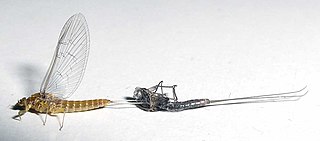A simile is a type of figure of speech that directly compares two things. Similes are often contrasted with metaphors, where similes necessarily compare two things using words such as "like", "as", while metaphors often create an implicit comparison. However, there are two schools of thought regarding the relationship between similes and metaphors. The first defines them as opposites, such that a statement cannot be both a simile and a metaphor — if it uses a comparison word such as "like" then it is a simile; if not, it is a metaphor. The second school considers metaphor to be the broader category, in which similes are a subcategory — according to which every simile is also a metaphor. These two schools reflect differing definitions and usages of the word "metaphor" and whether or not it encompasses similes, but both agree that similes always involve a direct comparison word such as "like" or "as".

Mayflies are aquatic insects belonging to the order Ephemeroptera. This order is part of an ancient group of insects termed the Palaeoptera, which also contains dragonflies and damselflies. Over 3,000 species of mayfly are known worldwide, grouped into over 400 genera in 42 families.

Baetidae is a family of mayflies with about 1000 described species in 110 genera distributed worldwide. These are among the smallest of mayflies, adults rarely exceeding 10 mm in length excluding the two long slender tails and sometimes much smaller, and members of the family are often referred to as small mayflies or small minnow mayflies. Most species have long oval forewings with very few cross veins but the hindwings are usually very small or even absent. The males often have very large eyes, shaped like turrets above the head.

The Pheasant Tail nymph or PT Nymph or Sawyer's Pheasant Tail is a popular all purpose nymph imitation used by fly anglers. It imitates a large variety of olive, olive-brown colored aquatic insect larvae that many fish including trout and grayling feed upon.

Stripping Cane is the second solo album from American singer/songwriter Jeffrey Foucault, released in 2004.

Cloeon is a cosmopolitan genus of mayflies of the family Baetidae.

Procloeon is a genus of small minnow mayflies in the family Baetidae. There are at least 20 described species in Procloeon, recorded from Africa, Europe, parts of S and SE Asia and North America.

Cloeon dipterum is a species of mayfly with a Holarctic distribution. It is the most common mayfly in ponds in the British Isles and the only ovoviviparous mayfly in Europe. Males differ from females in having turbinate eyes.

Ephemera vulgata is a species of mayfly in the genus Ephemera. This mayfly breeds in stationary water in slow rivers and in ponds, the nymphs developing in the mud.
Cloeon degrangei is a species of small minnow mayfly in the family Baetidae.
Cloeon languidum is a species of small minnow mayfly in the family Baetidae.
Cloeon petropolitanum is a species of small minnow mayfly in the family Baetidae.
Cloeon praetextum is a species of small minnow mayfly in the family Baetidae. It is found in Europe.
Cloeon schoenemundi is a species of small minnow mayfly in the family Baetidae. It is found in Europe.
Cloeon virens is a species of small minnow mayfly in the family Baetidae.

Pisciforma is a suborder of mayflies in the order Ephemeroptera. There are at least 410 described species in Pisciforma.
Siphloplecton is a genus of cleftfooted minnow mayflies in the family Metretopodidae. There are about 15 described species in Siphloplecton.







